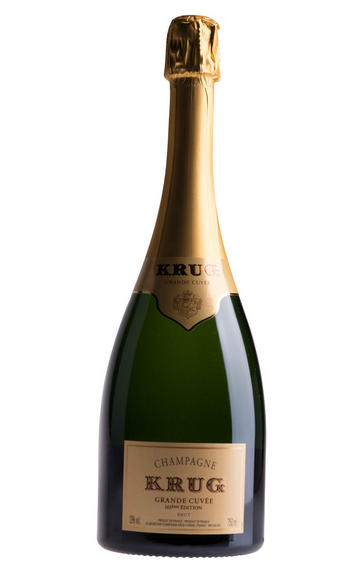
Champagne Krug, Grande Cuvée, 164ème Édition, Brut
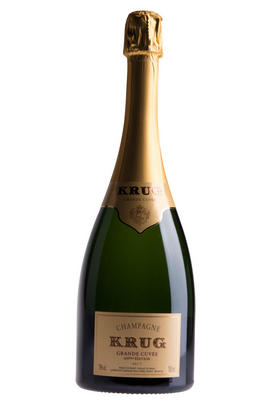
Critics reviews
Krug's NV Grand Cuvée 164 Edition is a total knockout. Based on the 2008 vintage, the 164th Edition shows all the crystalline tension and energy that is such a signature of the year. At times, the 164 reminds me of the 2008 vins clairs I tasted after harvest. The flavors are brisk, delineated and pulsing with energy, while the more oxidative notes that are such a signature of Krug Champagnes are not especially evident. A wine of total pedigree and class, the 164 reminds me of some of the great Grand Cuvées of the 1960s and 1970s I have been lucky to taste over the years. No Champagne lover will want to be without this spectacular, captivating wine. All that said, readers should be patient, as the 164 is painfully young, austere and in need of serious cellaring.
Antonio Galloni, Vinous (July 2017)
About this WINE
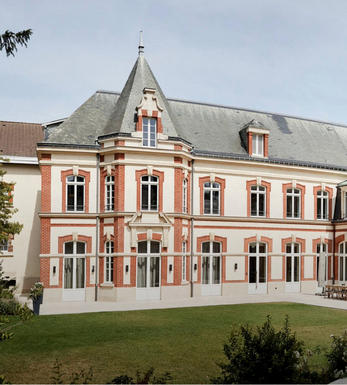
Krug
Krug was established in 1843 and has since specialised in producing only prestige and specialised champagnes. Krug is the only firm still producing all its champagne in small oak casks, an essential element for developing Krug's intense bouquet and complex flavours. Today, Henri, Rémi and Olivier Krug, who supervise every step of production, tasting and blending, represent the 5th and 6th generations.
With long periods of maturation (6-8 years), Krug champagne continues to age gracefully after release, developing an intensely rich, nutty flavour whilst remaining remarkably fresh.
Krug`s finest champagne is Clos du Mesnil, a 100%-Chardonnay based champagne that comes from a small walled vineyard at Le Mesnil-sur-Oger. It is one of the world`s greatest Blanc de Blanc champagnes.
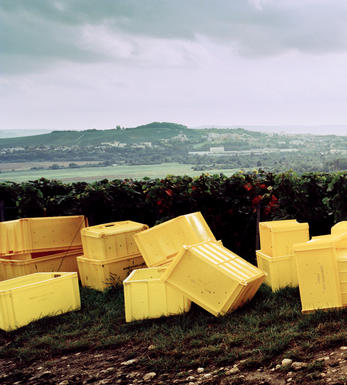
Brut Champagne
Brut denotes a dry style of Champagne (less than 15 grams per litre). Most Champagne is non-vintage, produced from a blend from different years. The non-vintage blend is always based predominately on wines made from the current harvest, enriched with aged wines (their proportion and age varies by brand) from earlier harvests, which impart an additional level of complexity to the end wine. Champagnes from a single vintage are labelled with the year reference and with the description Millésimé.
Non-vintage Champagnes can improve with short-term ageing (typically two to three years), while vintages can develop over much longer periods (five to 30 years). The most exquisite and often top-priced expression of a house’s style is referred to as Prestige Cuvée. Famous examples include Louis Roederer's Cristal, Moët & Chandon's Dom Pérignon, and Pol Roger's Cuvée Sir Winston Churchill.
Recommended Producers : Krug, Billecart Salmon, Pol Roger, Bollinger, Salon, Gosset, Pierre Péters, Ruinart
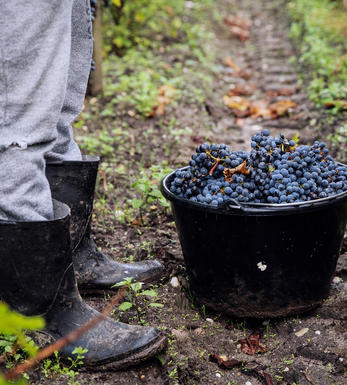
Champagne blend
Which grapes are included in the blend, and their proportion, is one of the key factors determining the style of most Champagnes. Three grapes are used - Pinot Noir, Chardonnay and Pinot Meunier.
26% of vineyards in Champagne are planted with Chardonnay and it performs best on the Côtes des Blancs and on the chalk slopes south of Epernay. It is relatively simple to grow, although it buds early and thus is susceptible to spring frosts. It produces lighter, fresher wines than those from Burgundy and gives finesse, fruit and elegance to the final blend. It is the sole grape in Blancs de Blancs, which are some of the richest long-lived Champagnes produced.
Pinot Noir accounts for nearly 40% of the plantings in Champagne and lies at the heart of most blends - it gives Champagne its body, structure, strength and grip. It is planted across Champagne and particularly so in the southern Aube district.
The final component is Pinot Meunier and this constitutes nearly 35% of the plantings. Its durability and resistance to spring frosts make the Marne Valley, a notorious frost pocket, its natural home. It ripens well in poor years and produces a soft, fruity style of wine that is ideal for blending with the more assertive flavours of Pinot Noir. Producers allege that Pinot Meunier lacks ageing potential, but this does not deter Krug from including around 15% of it in their final blends.


Buying options
Add to wishlist
Description
Krug's NV Grand Cuvée 164 Edition is a total knockout. Based on the 2008 vintage, the 164th Edition shows all the crystalline tension and energy that is such a signature of the year. At times, the 164 reminds me of the 2008 vins clairs I tasted after harvest. The flavors are brisk, delineated and pulsing with energy, while the more oxidative notes that are such a signature of Krug Champagnes are not especially evident. A wine of total pedigree and class, the 164 reminds me of some of the great Grand Cuvées of the 1960s and 1970s I have been lucky to taste over the years. No Champagne lover will want to be without this spectacular, captivating wine. All that said, readers should be patient, as the 164 is painfully young, austere and in need of serious cellaring.
Antonio Galloni, Vinous (July 2017)
wine at a glance
Delivery and quality guarantee